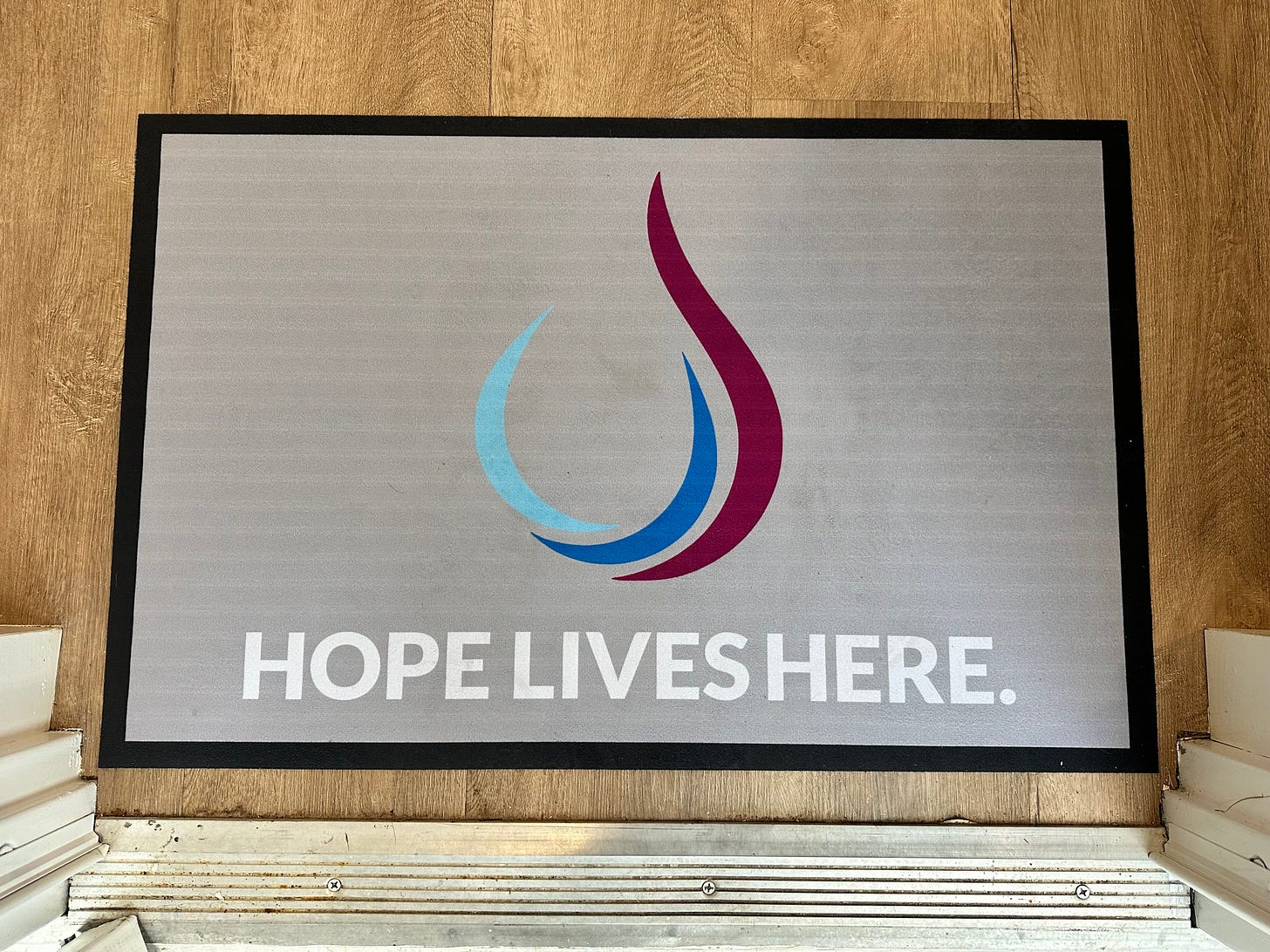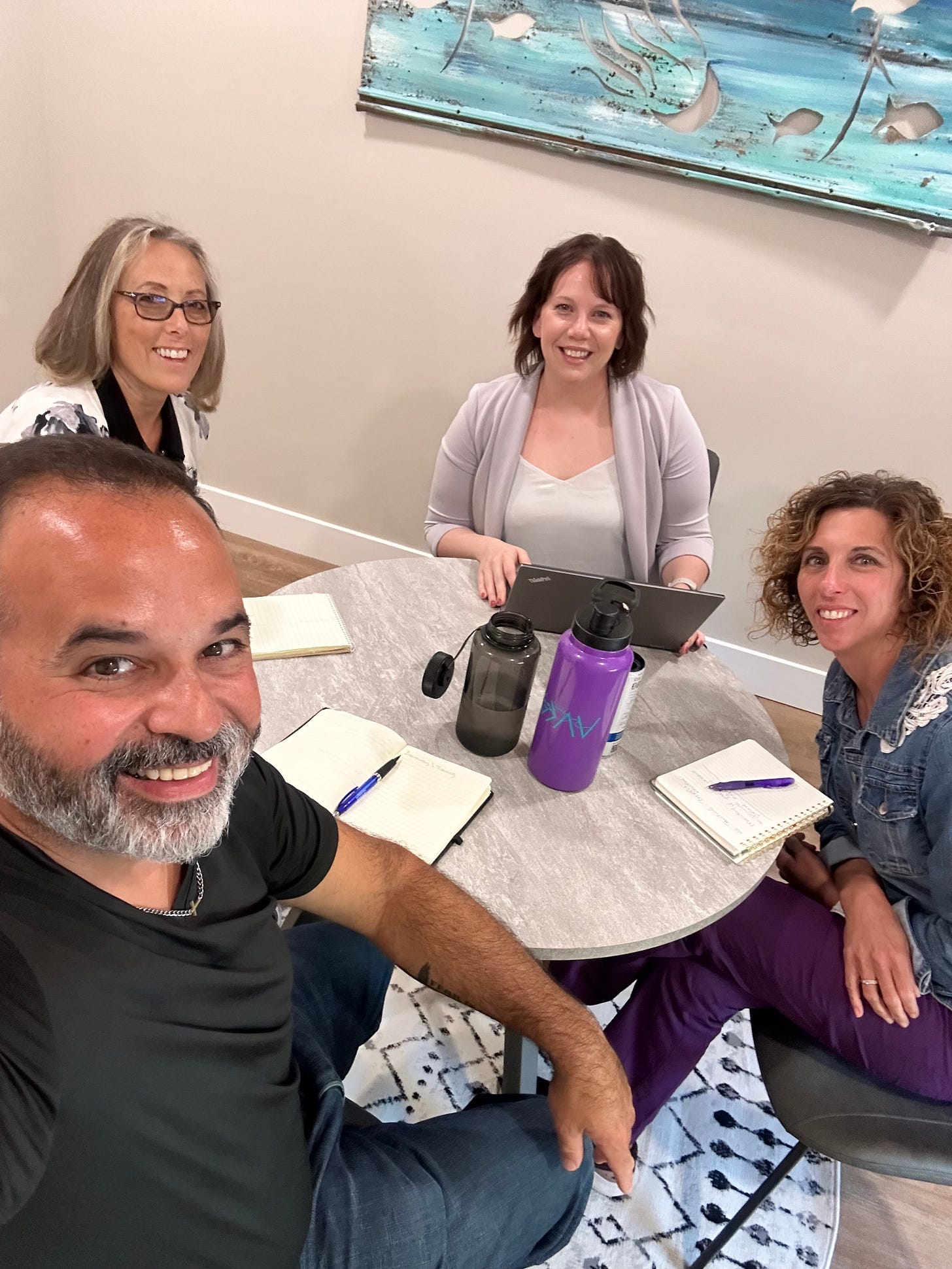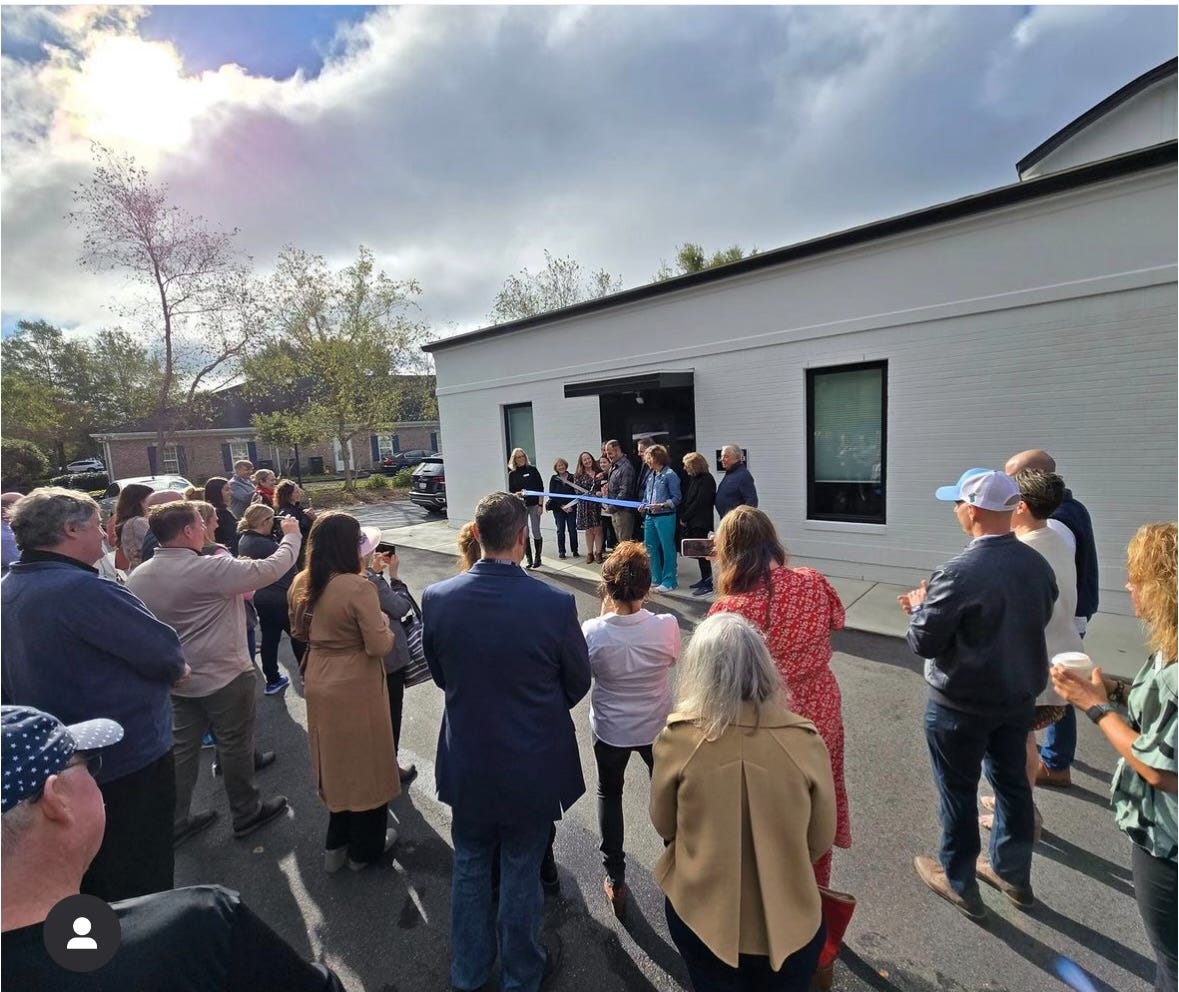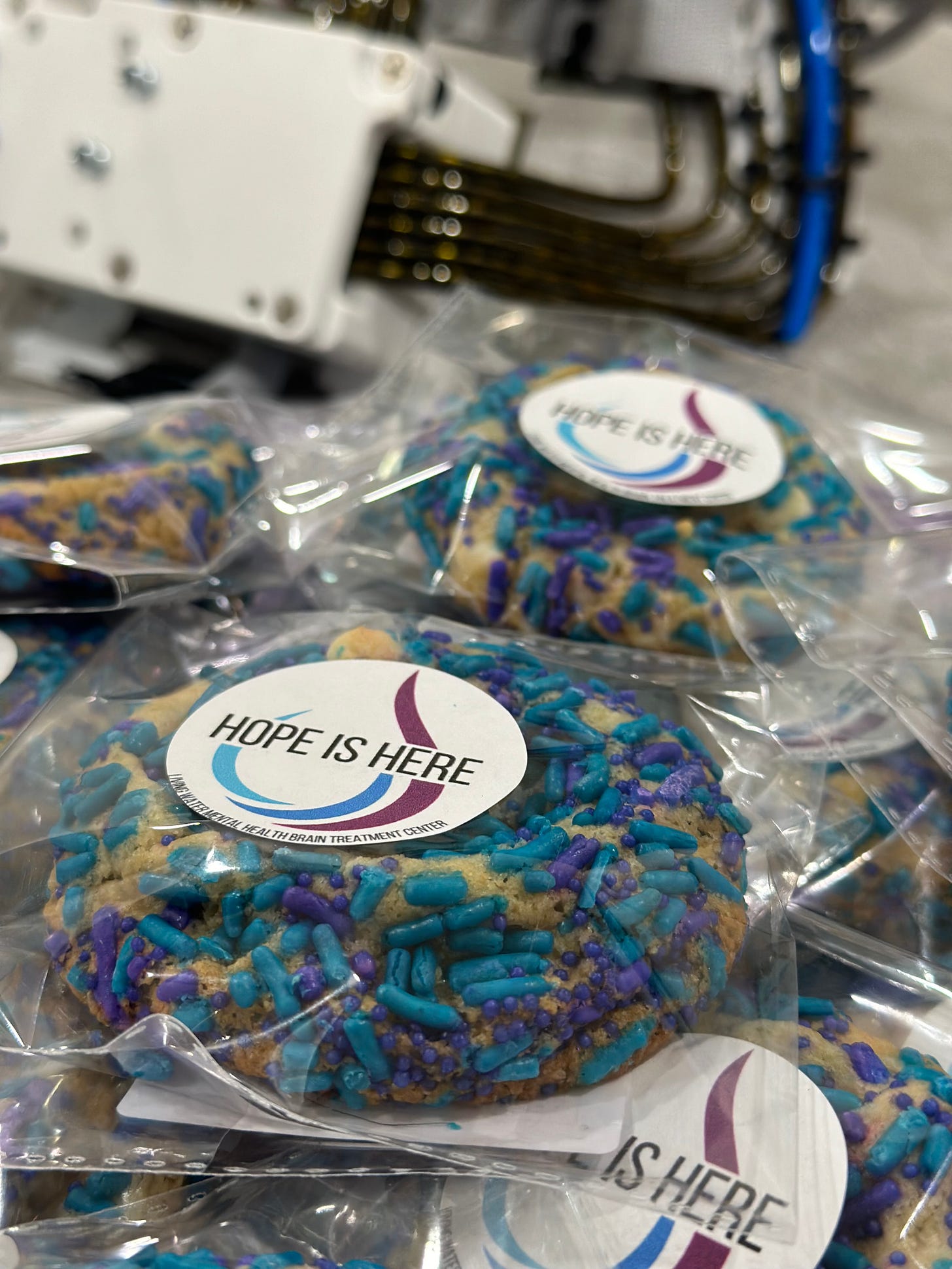Rural & Semi-Rural Mental Health Care
Addressing The Unmet Need, with Brain Stimulation and Faith
Your editor, Owen Muir, here. I am an atheist. But sometimes, I doubt my lack of faith. I have some degree of envy for those who feel the sense of the divine, in all honesty. I think that healthcare often does a bad job of interfacing with faith. We emphasize science, but we don't emphasize existential dread, thoughts and prayers, and the whole shebang that is getting sick and suffering. People want to be delivered from suffering; they don't necessarily want a 50% reduction in symptoms. I've been friends with Ben, the author of this article, for several years now. When he asked me to help him start a not-for-profit in his home state of South Carolina that would provide faith-informed care (to people who want it) and accessible care to everyone else— this sounded like a good idea. Thus, I agreed to help, and what follows is the story of that journey. Ben asked me if he should tone down the “faith in God and belief in Jesus” part of his story. I told him no—because his real story is his story. He has every right to his experience, Jesus and all. So, if the following reads like the work of a believer, that is because it is.
The first thing I will tell you about Horry County, South Carolina is that the “H” is silent - so you can stop the giggling.
If you’re unfamiliar with the area, you might know our largest city, Myrtle Beach. What you might not know? Horry County is one of the top 10 fastest-growing counties in the country and covers over 1100 square miles, enough to fit 2 New York Cities (including the outer boroughs) and almost all of Westchester County.
The population has almost doubled since 2010 and now sits around 400,000 full-time residents. Our population swells over the summer with the addition of more than 17,000,000 tourists who come to dine in our restaurants, frolic on our beautiful beaches, and play on our 90+ golf courses. Yes, we love tourists, and while we might not love the traffic that comes with them, we are deeply grateful for their time—and money—pumping into our local economy.
Once you leave Myrtle Beach, Horry County's population begins to change dramatically. We are the fourth-most rural county in the state, with a 2022 median income of $30,425. Approximately 10% of our population are veterans, split almost evenly between the Vietnam era and older and Gulf War I and later.
Our schools are overcrowded, but fortunately, so are our churches, as our area houses of worship are among the fastest-growing in the entire U.S. We do not have a Whole Foods—I doubt the economics or demand would support it—but we are getting our first Trader Joe’s sometime soon. We have a bunch of Walmarts and just enough Chick-fil-As and Bojangles.
Most people who live near the beach weren’t born in Horry County. They’ve come at various stages of their lives to resettle in a community that is slower and kinder than perhaps where they’ve come from. Southern hospitality is a real thing, and many transplants, such as myself, embrace it fully. Friday night lights are big, and high school rivalries can be intense.
If I could sum up what life is like here in Horry County, South Carolina, to me, it’s full of God, hospitality, community, and humidity. But, not unlike other communities in America, we are also dealing with the mental health pandemic that is taxing our incredibly limited resources, which, despite the best efforts of many passionate medical and behavioral health professionals, struggle to meet the demand and significantly impact treatment outcomes.
Case in point: our community of approximately 400,000 residents has just one dedicated in-patient psychiatric facility with 22 beds. If there’s no “room in the inn,” psychiatric patients are given a choice: transport to MUSC in Charleston—a quick 90- to 180-minute journey depending on where in the 1,100 square miles you live—or discharge.
When my family moved here in 2020, we quickly fell in love. The kindness, slow pace of life, and ease of southern living were everything we thought they would be and helped our children transition to three new schools with relative smoothness. We quickly planted roots and found ourselves eager to give back, whether through volunteering at school, a local pet shelter, or our church, which has truly become our home away from home.
During this transition, my wife seized the opportunity to pursue her true passion: baking. She opened a home-based, oversized gourmet cookie business and quickly became a well-known name among farmer’s markets, local events, and the media, as well as shortly thereafter in several high-profile retail locations throughout the county. (She ships anywhere in the lower 48, too, so if you like cookies as much as shameless plugs, feel free to check out her 120+ varieties at cookieworx.com.)
During this time, we also faced some mental health challenges with our kids. This experience highlighted the limited resources in our community. While there are many great counselors in the area, many are fully booked, and finding one that accepts insurance can be a significant challenge. (I'll defer to Dr. Muir's expertise and long record of addressing the complexities of insurance coverage and healthcare access, as he has done so well in this newsletter for years.)
What I haven’t yet shared is that I’ve battled—and been previously diagnosed with—depression, anxiety, and PTSD, much of it rooted in early childhood trauma. In my late 30s and early 40s, life circumstances became particularly challenging, and I struggled. Initially, I resisted Western medicine and turned to alternative therapies—some healthy, like acupuncture and exercise, and others not so healthy, like whiskey and starvation. These were dark times, made even harder by the fact that much of my life was spent as an atheist, unable to reconcile the suffering I had endured with the idea of a loving God.
I was lost— mentally, physically, and spiritually.
Then, one day about 10 years ago, certain people came into my life and began talking about their faith in a way that wasn’t preachy, but rather, oddly and tremendously comforting. After hearing their words and feeling their feelings, there was a sense of peace in the chaos, a calm in the storm that I desperately wanted. It was my “God-shaped hole” crying out. I was broken enough to be ready to listen.
The following day, I was walking down a street in Washington, D.C., after a business meeting with someone from a completely different world whose faith had a profound impact on me. He was full of grace, love and kindness that combined emanated a type of peace that I so desperately had been craving. Suddenly, I felt a profound spiritual awakening, like a lightning bolt has jump-started something in my heart. For the first time in my life, I felt a connection to God and a calling to know His son, Jesus Christ.
I spent the next several years reading devotionals and, more slowly, digesting scripture. I kept this a secret from almost everybody except my incredibly supportive wife, parents, and in-laws. I wouldn’t say I was walking with Jesus, but I was definitely crawling with Him. This newfound relationship with my Lord helped me start to process my mental health differently. No, the storms didn’t pass, and I was in no way, shape, or form “healed”, but like a newly built framed house, I finally had a foundation that wouldn’t fail.
This support helped me seek treatments to start addressing my mental health challenges. Some worked, some didn’t. Some were risky, others were not. Combined though, after decades of suffering and at a tremendous cost, I finally felt like I was moving in the right direction.
Fast forward to 2020, shortly after my family planted our roots, and armed with a calling to dive even deeper into my faith, we found our church home at Low Country Community Church (lc3church.com) in Murrells Inlet, South Carolina, and it was then I became even more transformed. In 2021, my whole family was baptized at the beach, dedicating our lives to Jesus Christ, our Lord and Savior. My spiritual journey accelerated, and we became more involved in the community. This year, I was blessed to preach twice at my church and have been asked to deliver messages again in 2025. When they say a Christ follower is "born again," it's not just hyperbole. Every aspect of your life is reexamined, you are made anew, and you begin to strive for an eternal perspective rather than an earthly one. Or at least, that's the hope.
None of this means life gets any easier; in fact, I could say certain parts have gotten harder. But there’s a saying in Christian circles that I’ve grown to accept, even though I don’t like it: " The devil doesn't come after the one he’s already got.”
With my feet on a firm foundation, I can weather the storms of life more easily, knowing that there is purpose in suffering and surrendering to His will is a sign of strength, not weakness.
And this brings us to January 2024.
Around last New Year, I felt a profound calling from the Lord and a burden on my heart to address the mental health crisis impacting my community. I have encountered countless individuals struggling with depression, anxiety, OCD, bipolar disorder, PTSD, and substance abuse. I sincerely wanted to help but often felt powerless to do so. My community was hurting, and my heart ached for the parents, veterans, friends, first responders, children, addicts, grandparents, caregivers, and neighbors who were suffering.
They say that when you walk closer with Christ, you tend to feel the world’s burdens even more—and that was certainly true for me. So I did what I had more recently learned to do when confronted with a struggle: I went to the Lord in prayer day after day, asking Him, “What am I to do?”
Then, one day, He answered.
I had what can only be described as a vision to build a mental health center in my community. My first reaction was shock as I have no qualification whatsoever to do this, so I kind of did a figurative double take, but when the vision lingered, I felt this is what He wanted me to do and that if it were His will, He would prepare the way - as He always does.
I picked up the phone and called my friend Dr. Owen Muir, who I'd met years earlier when he spoke at events my last company produced. He's one of the most brilliant minds I know and is laser-focused on helping people get better, no matter the financial, emotional, or time cost. I was reading about the drug-free neuromodulation treatments he was using at his clinic in New York City, Fermata, including TMS (transcranial magnetic stimulation). The results were astonishing: 79% remission, drug-free, and relief in as little as 5 days, and yes, even (sometimes) covered by insurance, too. It seemed too good to be true.
After a long conversation with Dr. Muir about these and other exciting, drug-free neuromodulation treatments, I asked him the big question. “Why can’t these treatments exist in my community? Can this model only succeed in big cities like New York?”
He quickly replied, “There’s no reason,” and that’s when the idea for Living Water Mental Health BRAIN Treatment Center was hatched.
I went back to the Lord in prayer, trying to seek confirmation, and another burden was placed on my heart. I was called to build this center as a nonprofit with an established mechanism to deliver this cutting-edge treatment, even below market cost, to expand accessibility. Beholden to the community, not shareholders. Or, as it is written in Matthew 19:20, “Do not store up for yourselves treasures on earth, where moth and rust destroy, and where thieves break in and steal. But store up for yourselves treasures in heaven, where neither moth nor rust destroys, and where thieves do not break in or steal.”
People ask me how I knew this was the Lord’s calling, and the short answer is I don’t. It did kinda feel right, and because this was so outside of my comfort zone, it served as a type of validation because one of the many things Scripture tells us is that God chooses people to do what is hard, not what is easy. Just read the story of Joseph, Noah, Job, David, Ruth, Habakkuk, or anyone in the New Testament, especially Paul and Peter. As Hebrews 11:1-6 tells us, “Now faith is the substance of things hoped for, the evidence of things not seen.”
So, as God would have it, when I spoke with Dr. Muir, he shared that he was in the process of building another company with two healthcare veterans, called Breakthrough6, that would be in the business of planting hundreds of mental health treatment centers throughout the country. Talk about paving the way. Their model is to provide the clinical infrastructure for these centers to rapidly achieve scale by leveraging non-invasive, neuromodulation treatments that require a physician to prescribe virtually- but not administer, thus further reducing a barrier to care that especially plagues markets like mine where physicians, especially psychiatrists, are so incredibly rare and expensive.
When I went back to Dr. Muir and shared with him my vision, he quickly gave me his support and told me that Breakthrough6 would use my location as a pilot site and, because of my mission, allow us to operate as a nonprofit. So I spent the next several months figuring out how to build, incorporate, run, and fund a nonprofit, then spent the next few months after that figuring out how to run a brain treatment center that specializes in TMS, an FDA-cleared, cutting-edge, rapid-acting mental health treatment that is tremendously effective in treatment depression, OCD, anxiety and many other behavioral disorders (and the subject of many articles in this newsletter that I encourage you to read if you haven’t.)
Together, Living Water and Breakthrough6, with Dr. Muir at the center of both (he also serves as our Medical Director), developed the practice plan to bring affordable, rapid-acting mental health treatments to Horry County through a diverse revenue model that would include some government and private insurance, self-pay and, most importantly to me, a very generous financial hardship scholarship program that would provide over an 80% reduction in treatment cost to the most financially disadvantaged people.
I’ve called this my “Robin Hood, without the arrows” approach. While I know I’m not the first to use that phrase, it seems incredibly appropriate for the patchwork approach of insurance, self-pay, grant, and donation-based operations I’m trying to accelerate here in South Carolina. Equally important, I’m striving to create a community-driven infrastructure that embraces a variety of novel, breakthrough mental health treatments. My goal is that as new FDA-cleared modalities become available, we can reduce the dual stigma surrounding mental health—both in discussing it and seeking treatment—so people feel empowered to pursue healing.
One of the ways I’m working toward this goal is by meeting people where they are and sharing my own struggles, hoping it encourages them to feel more comfortable discussing theirs. Over the past several months, I’ve been a vendor at more than a dozen farmers’ markets and fairs, appeared on our popular local morning show, Carolina AM, led a small group of about 25 men to discuss mental health and scripture, preached on mental health at my church, spoken at a Pastor’s breakfast roundtable, engaged with veterans' organizations, and met with numerous individuals, community leaders, and others curious to learn more about what we’re doing. There is still so much work to be done, and I am relentlessly trying to connect with as many people as possible. This approach is about as grassroots as it gets, but I believe the investment will be worth it.
On November 12, 2024, we had our ribbon-cutting ceremony, and among the 50+ attendees who came out to support us were representatives of Senator Tim Scott and Congressman Russell Fry, two local leaders whose offices have been incredibly supportive of my efforts going back to the beginning of this wild ride. In addition to their efforts, I have been blessed to have the support of a number of local leaders in TV, radio, the chamber of commerce, local businesses, healthcare providers, friends, family, and, of course, my church community.
On November 19, 2024, we started treatment on our first patient, [with all identifying details redacted], a young person who had a long history of trauma, presented with major depressive disorder, general anxiety disorder, PTSD, suicidal ideation, and failed many medications over the years. This human works at a company we’ve all heard of. It’s not a “fancy” job. This individual had almost given up hope that they would ever feel better. On the day of the intake, their HAM-D—a depression rating scale— score was 27.
By the grace of God putting this burden on my heart, putting Dr. Muir in my life, and placing every stone on the footpath of my journey, starting with the traumas I experienced as a child, we were able to deliver the most advanced, effective mental health treatment available on the planet earth to this young person, right here in Myrtle Beach, South Carolina, population 400,000.
After several days, her treatment was paused because…her HAM-D was 0. For the first time in years, our patient was no longer clinically depressed. To paraphrase slightly, “Grateful for every moment, and I am hopeful again!”.
As I sit here in early December, I still have more questions than answers. I'm uncertain about our future working capital as a mostly self-funded nonprofit startup. I don't know if all our patients will respond positively to treatment. Statistically, some may not. However, this clinic was founded on faith, and it's through the support of my church community, neighbors, family, friends, Dr. Muir, and Breakthrough6 that we were able to open our doors and begin treating patients in less than five months after incorporation and receiving our 501(c)(3) status.
I pray this faith-based, hybrid model of compassionate, accessible mental health care can succeed and, if God’s will, be replicated in other communities that can’t widely access or easily afford these life-altering, if not life-saving, treatments.
Living Water exists because God used people like Dr. Muir, Robert Jordshaugen, Lincoln Fish, and others who researched and developed the technology, processes, medical knowledge, and infrastructure to deliver “big city” care in small communities like mine. Over 97% of America’s land mass is rural or semi-rural, so there’s a lot of need.
Living Water’s vision is to glorify God by providing breakthrough, rapid-acting mental health treatments to all in need. Our mission statement is to bring hope and healing by offering compassionate, effective treatments that alleviate mental health suffering and restore peace, supporting spiritual restoration throughout the healing journey.
John 7:38 says, “He who believes in Me, as the Scripture said, ‘From his innermost being will flow rivers of living water.” Water is cleansing, both physically and spiritually, and we pray that we can be used by God to help remove the obstacles that prevent many from finding mental health and peace and have the opportunity to experience spiritual renewal.
I believe mental health is a journey, not a destination, and a relationship with God is the only way we can gain the strength and support needed to navigate life's challenges day after day.
James 1:2 says, “Consider it all joy, my brethren when you encounter various trials.” Notice it didn’t say “if”, but “when”. Life is hard; there is suffering, but there is purpose in it. The strength to navigate the ups and downs can only come from a relationship with our Creator, in my tradition. Some people find their way on their own, while others need support. We pray to be part of that support system used by God to help those who are suffering.
Thank you for taking the time to read my story. Suppose you are passionate about supporting rural and semi-rural mental healthcare. In that case, I’d appreciate your consideration of making a fully tax-deductible donation to support our efforts to make these treatments accessible to all. To do so safely and securely, please visit us at livingwaterclinics.com/donatenow. Thank you.
By Ben Greenzweig, Founder & Executive Director, Living Water Mental Health BRAIN Treatment Center, a 501(c)(3) nonprofit organization
Thank you, readers!










I really enjoyed and appreciated this post. It’s incredibly authentic. As a person of faith, a Father and a Grandfather of 4, I’ll tell you that my faith gives me a framework for living, thinking and for interacting with others. All around us we see bad leaders, failed institutions and widespread nihilism. People are craving principles, values and community centered on those principles. The description of the author’s spiritual awakening encountering someone who “….was full of grace, love and kindness that combined emanated a type of peace that I so desperately had been craving.” In a country seemingly preoccupied with narcissistic leaders; the author’s mission driven story of action and impact is inspiring. Faith creates purpose. Purpose inspires action. Action inspires impact and in this case, critical mental health services and infrastructure. Thanks for this thoughtful and inspiring post.